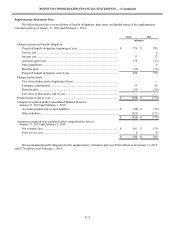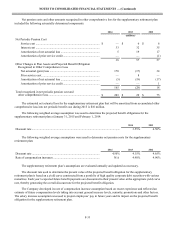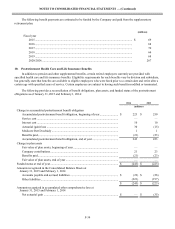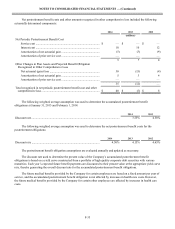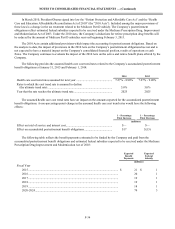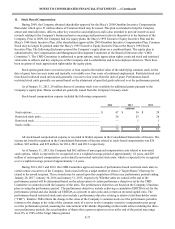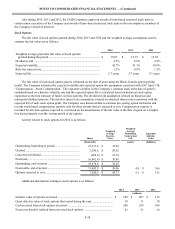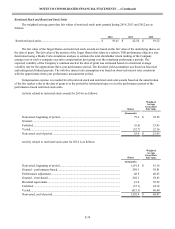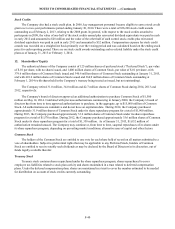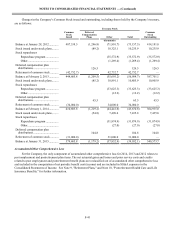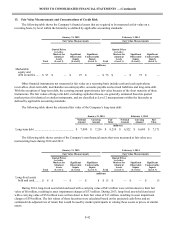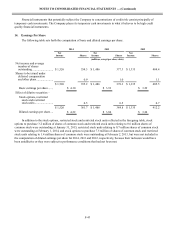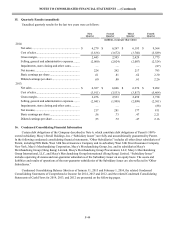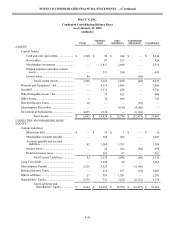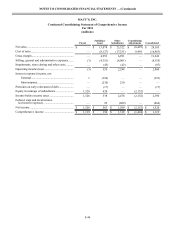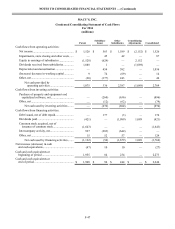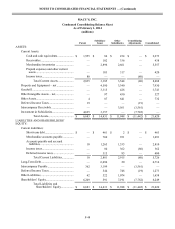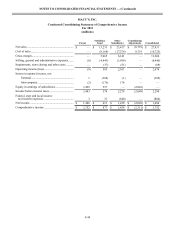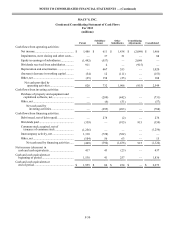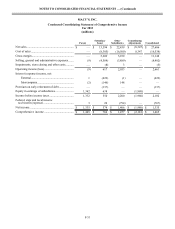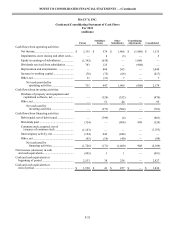Macy's 2014 Annual Report Download - page 89
Download and view the complete annual report
Please find page 89 of the 2014 Macy's annual report below. You can navigate through the pages in the report by either clicking on the pages listed below, or by using the keyword search tool below to find specific information within the annual report.
NOTES TO CONSOLIDATED FINANCIAL STATEMENTS — (Continued)
F-42
13. Fair Value Measurements and Concentrations of Credit Risk
The following table shows the Company’s financial assets that are required to be measured at fair value on a
recurring basis, by level within the hierarchy as defined by applicable accounting standards:
January 31, 2015 February 1, 2014
Fair Value Measurements Fair Value Measurements
Total
Quoted Prices
in Active
Markets for
Identical
Assets
(Level 1)
Significant
Observable
Inputs
(Level 2)
Significant
Unobservable
Inputs
(Level 3) Total
Quoted Prices
in Active
Markets for
Identical
Assets
(Level 1)
Significant
Observable
Inputs
(Level 2)
Significant
Unobservable
Inputs
(Level 3)
(millions)
Marketable
equity and
debt securities....... $ 97 $ — $ 97 $ — $ 75 $ — $ 75 $ —
Other financial instruments not measured at fair value on a recurring basis include cash and cash equivalents,
receivables, short-term debt, merchandise accounts payable, accounts payable and accrued liabilities and long-term debt.
With the exception of long-term debt, the carrying amount approximates fair value because of the short maturity of these
instruments. The fair values of long-term debt, excluding capitalized leases, are generally estimated based on quoted
market prices for identical or similar instruments, and are classified as Level 2 measurements within the hierarchy as
defined by applicable accounting standards.
The following table shows the estimated fair value of the Company’s long-term debt:
January 31, 2015 February 1, 2014
Notional
Amount Carrying
Amount Fair
Value Notional
Amount Carrying
Amount Fair
Value
(millions)
Long-term debt...................................................... $ 7,090 $ 7,236 $ 8,219 $ 6,522 $ 6,684 $ 7,171
The following table shows certain of the Company’s non-financial assets that were measured at fair value on a
nonrecurring basis during 2014 and 2013:
January 31, 2015 February 1, 2014
Fair Value Measurements Fair Value Measurements
Total
Quoted Prices
in Active
Markets for
Identical
Assets
(Level 1)
Significant
Observable
Inputs
(Level 2)
Significant
Unobservable
Inputs
(Level 3) Total
Quoted Prices
in Active
Markets for
Identical
Assets
(Level 1)
Significant
Observable
Inputs
(Level 2)
Significant
Unobservable
Inputs
(Level 3)
(millions)
Long-lived assets
held and used........ $ 8 $ — $ — $ 8 $ 13 $ — $ — $ 13
During 2014, long-lived assets held and used with a carrying value of $41 million were written down to their fair
value of $8 million, resulting in asset impairment charges of $33 million. During 2013, long-lived assets held and used
with a carrying value of $52 million were written down to their fair value of $13 million, resulting in asset impairment
charges of $39 million. The fair values of these locations were calculated based on the projected cash flows and an
estimated risk-adjusted rate of return that would be used by market participants in valuing these assets or prices of similar
assets.


